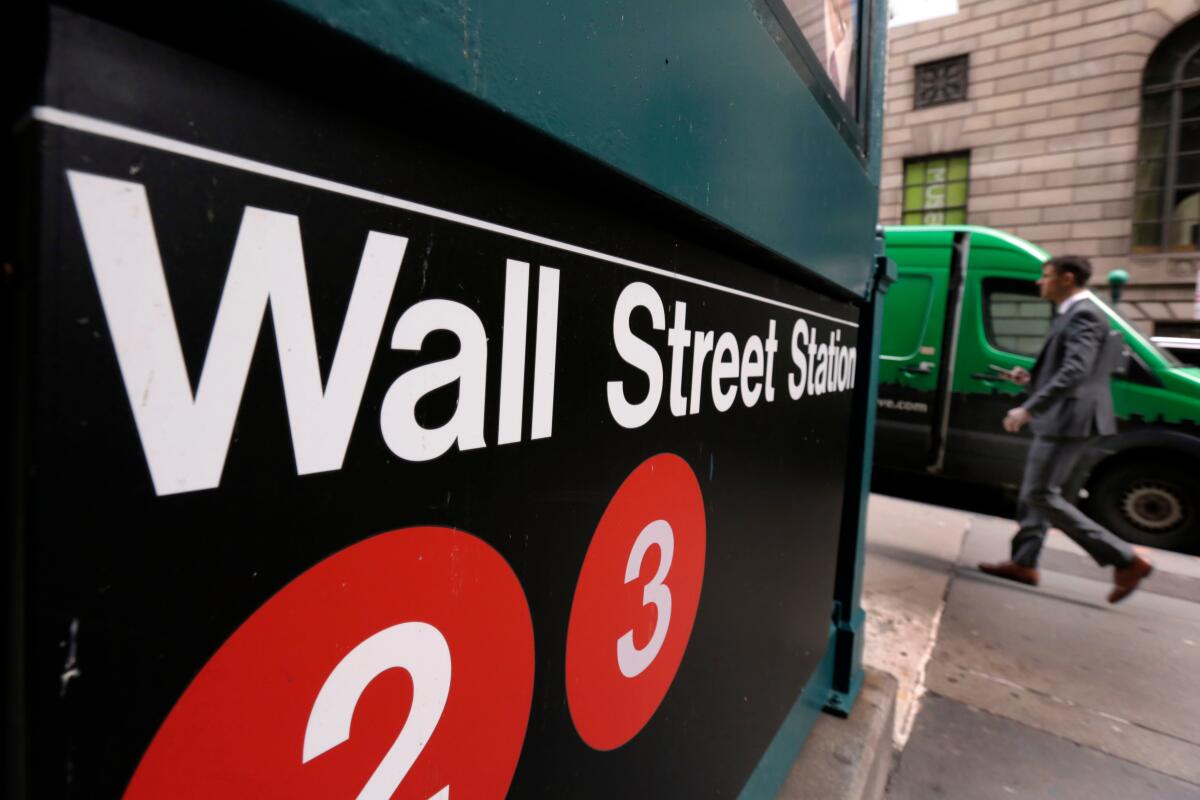Stocks slump, bond yields soar after a hot inflation reading

- Share via
Stocks slumped and bond yields moved sharply higher Thursday after a hot reading on inflation led to greater expectations that the Federal Reserve will have to move forcefully to cool down the economy by raising interest rates.
The hottest inflation reading since 1982 sent the Standard & Poor’s 500 index down 1.8%. It also sent Treasury yields jumping, as traders built up bets the Fed may have to apply the brakes to the economy with a bigger-than-usual hike in interest rates next month. The yield on the 10-year Treasury topped 2% for the first time since August 2019, according to Tradeweb.
Volatile trading has been the norm on Wall Street this year as investors try to gauge how much and how quickly the Fed will raise interest rates to tame surging inflation. The benchmark S&P 500 has fallen three out of the last five weeks and is now 6.1% below the all-time high it set Jan. 3.
More than 85% of the stocks in the S&P 500 closed lower after another day of sharp swings for the indexes. The Dow Jones industrial average fell 1.5% and the Nasdaq composite slid 2.1%.
Home sellers profit from area development, including SoFi Stadium, site of Super Bowl 2022. Rents are up, too. Now, the city is less affordable.
“We caution that markets could remain choppy for the coming months until either inflation stabilizes or the market is comfortable that the Fed is doing enough, but not too much,” said Matt Peron, director of research at Janus Henderson Investors. “The margin of error for the Fed is getting smaller, but our base case is that the markets will stabilize in the second half of this year.”
Inflation has been building over the last year as the economy roared back from the pandemic. Supply shortages and snags in global supply chains also pushed inflation higher, and prices at the consumer level were up 7.5% last month from a year earlier.
A separate report also said fewer workers filed for unemployment benefits last week than expected. That’s encouraging for workers, but it could add more upward pressure on inflation.
The strong job market and high inflation have forced the Federal Reserve to make a hard pivot, and it said it’s ready to begin removing the massive aid it has poured into financial markets. Such moves to raise interest rates could rein in inflation, but they would also put downward pressure on all kinds of investments including stocks and cryptocurrencies.
After the inflation report’s release, traders see a 95.7% chance that the Fed will raise short-term interest rates by half a percentage point at its meeting next month, double the traditional move. A day earlier, those same traders saw just a 24% probability of such a big move, according to CME Group. Whatever its size, it would be the first increase since 2018.
In the bond market, yields were jumping most for shorter-term Treasurys. The two-year yield leaped to 1.62% from 1.36% late Wednesday, a huge move. That rate tends to track expectations for what the Fed will do.
Federal law allows the government to force a huge discount on drugs it funded, but it’s hasn’t claimed its rights on the hugely expensive prostate drug Xtandi.
The 10-year yield also rose, to 2.05% from 1.93%, but not by as much as the two-year Treasury. It tends to move more on expectations for future inflation and economic growth.
“The fixed-income market itself has been flirting and really trying to break through that psychological 2% level, and it did so today,” said Megan Horneman, director of portfolio strategy at Verdence Capital Advisors.
The S&P 500 fell 83.10 points to 4,504.08. The Dow slid 526.47 points to 35,241.59. The Nasdaq lost 304.73 points to close at 14,185.64.
Small-company stocks also fell. The Russell 2000 dropped 32.34 points, or 1.6%, to 2,051.16.
Expectations for higher rates helped send several Big Tech stocks lower, including a 2.8% drop for Microsoft. That’s been the usual reaction in the market recently, a mirror image to the preceding years when ultra-low rates helped send tech stocks to the market’s biggest gains.
Energy stocks, which can benefit from higher inflation as energy prices rise, and raw materials companies held up better than other sectors.
Walt Disney Co. jumped 3.3% for the biggest gain in the S&P 500 after it reported a rebound in theme park attendance last quarter and said it added more subscribers to its Disney+ streaming service than analysts expected. Both its profit and revenue for the latest quarter topped Wall Street’s forecasts.
Figment, a Disney character revived from the ‘80s, sparks another merchandise frenzy fueled by TikTok posts, committed fans and kind strangers.
If companies can keep increasing their profits, their stock prices could continue to rise even if higher interest rates limit how much stock investors are willing to pay for each $1 of earnings.
That’s why one of the big questions on Wall Street is how companies will navigate the higher inflation sweeping the world.
At Coca-Cola Co., Chairman and Chief Executive James Quincey said the company probably will raise some prices to offset rising transportation and commodity costs. But Quincey said the company is treading carefully.
“We do not want to lose customers,” he said.
Coca-Cola rose 0.6% after it reported stronger profit for the latest quarter than expected.
Cereal maker Kellogg expects to see double-digit inflation for ingredients as well as packaging cartons and cans this year. The company is also raising prices. Its shares rose 3.1%.
— Associated Press writers Dee-Ann Durbin and Yuri Kageyama contributed to this report.
More to Read
Inside the business of entertainment
The Wide Shot brings you news, analysis and insights on everything from streaming wars to production — and what it all means for the future.
You may occasionally receive promotional content from the Los Angeles Times.













